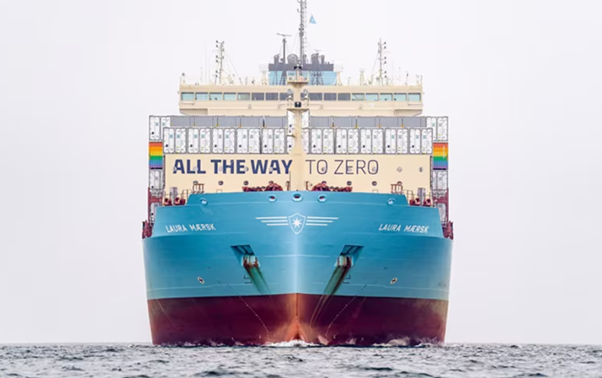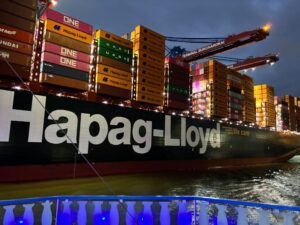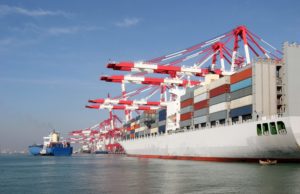The Egyptian president Abdel Fattah El-Sisi met on December 6 with Robert Maersk Uggla, the chairman of the board of directors of the A.P. Moller-Maersk Group, on the sidelines of the president’s state visit to Denmark. The president’s historic state visit to Denmark attracted the attention of the media, as it marks a historic milestone in Egypt-Denmark relations.
President El-Sisi praised the existing cooperation with Maersk, stressing Egypt’s appreciation for the efforts made by the company to develop a number of Egyptian container terminals with the aim of transforming them into global container handling terminals in the eastern and southern Mediterranean region.
The president noted the company’s projects to produce and supply its ships with green fuel, which contributes to making Egypt a regional hub for the company’s operations, whether in terms of container trade or clean fuel production.
Furthermore, the spokesman for the presidency, ambassador Mohamed El-Shennawy, said the chairman of the Danish company thanked the president for the support provided by the Egyptian government to the company’s operations in Egypt and noted Egypt’s efforts to attract foreign investments in various sectors, as well as removing any obstacles facing companies operating in Egypt.
He emphasized the company’s keenness to enhance its cooperation and consider increasing the scope of its business in Egypt.
The president Abdel Fattah El-Sisi met in Copenhagen on December 7 with Danish prime minister Mette Frederiksen, as part of the president’s state visit to Denmark.
The two sides agreed to advance cooperation between Egypt and the Kingdom of Denmark in a wide range of sectors, including primarily maritime transport, energy and green transition, health and scientific research, investment, agriculture, tourism, communication and Information technology, combating illegal migration and terrorism, and fighting poverty and desertification.
Danish shipping companies have been trading with and sailing to Egypt for many years. Last year, Danish shipping companies exported goods worth 4.1 billion DKK to the Egyptian market.
“It is wise that the Danish government has prioritised collaboration with our African partners. There is enormous potential for green energy in Egypt. Danish shipping companies are already looking to Egypt as a potential partner in producing the green fuels that our industry will require on a large scale in the coming years. I hope that President Sisi’s visit to Denmark will help promote trade and energy collaboration,” said Anne H. Steffensen, CEO of Danish Shipping.
There are two particular reasons why Egypt is an important country for Danish shipping and why its significance for the industry is only expected to grow in the coming years.
First, Danish shipping has been one of the major users of the Suez Canal over the years. Hundreds of Danish-operated vessels pass through the canal every year.
However, the attacks by the Houthis on civilian merchant ships in and around the Red Sea, south of the Suez, last year brought much of this traffic to a halt. Most Danish ships now take the much longer route around Africa instead, with negative consequences for both the climate and crew welfare.
“Egypt is a bridge between Africa and the Middle East, making it an important diplomatic partner for Denmark and other Western nations. Hopefully, Egypt will also play a role in resolving the conflict in the Red Sea region, so our ships can once again sail freely and safely in the area,” added Anne H. Steffensen.
Secondly, Egypt is an essential partner in the energy sector. The country aims to source 42% of its electricity from renewable energy by 2030.
Denmark and Egypt have established an energy collaboration aimed at supporting Egypt’s green transition.



